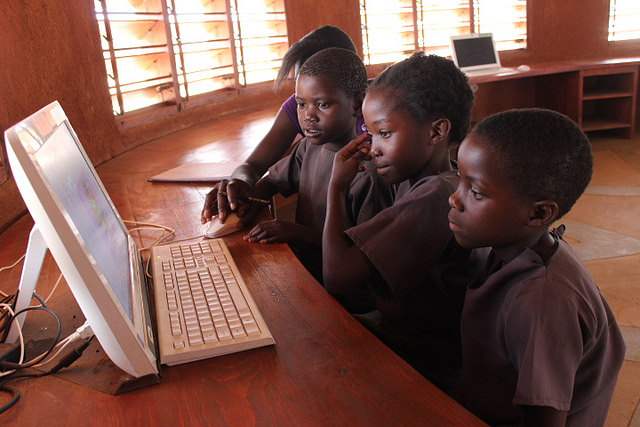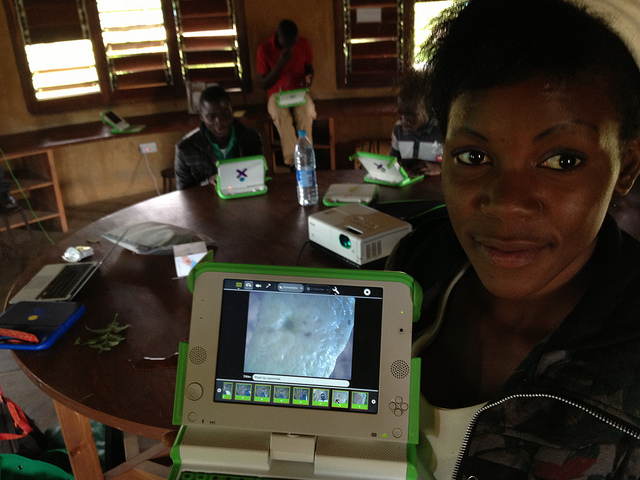LubutoLiteracy: Use of Digital Technology to Teach Reading in Zambia
Lubuto Library Partners (LLP) in Zambia employed digital technology to create engaging, accessible means of teaching children to read in their mother languages. LubutoLiteracy lessons are an upgrade and improvement on a pilot set of 700 mother-tongue literacy lessons (100 in each of the 7 major Zambian languages) created by LLP in 2011 with support from EIFL's Public Libraries Innovation Programme. Creation of this new and dramatically improved set of lessons was made possible by an All Children Reading grant, supported by USAID, World Vision and Australian AID. The new lessons were designed by an expert from the U. of Zambia who had also designed a new reading curriculum introduced by the Zambian government. The lessons thus extend the school curriculum to computer and mobile platforms, reaching beyond the classroom to computers and mobile devices everywhere these languages are spoken as the mother tongue: Nyanja, Bemba, Lozi, Luvale, Lunda, Tonga and Kaonde.

Lubuto Library Partners (LLP) in Zambia employed digital technology to create an effective means of promoting literacy and reading. LubutoLiteracy is a pioneering program of high-quality mother-tongue materials to teach children to read on an accessible digital platform which are about to be deployed at national scale in Zambia in partnership with government and stakeholders. The initiative demonstrates the role that libraries can play in addressing key issues in education.
Research has shown that children learn to read most effectively in their mother tongue, and that learning in local languages is particularly beneficial to girls. Unfortunately, high quality mother tongue teaching and learning materials remain out of reach for most Zambian children. At the same time, much attention has been paid to tackling the digital divide and increasing the availability of information and communication technology (ICT) in developing countries. Unfortunately, many initiatives focus exclusively on the technology itself and limit their goals to providing access.
LubutoLiteracy program
In response to these issues, LLP developed the LubutoLiteracy program, which especially targets the most vulnerable children and youth and connects them to their culture while exposing them to ICT and helping them learn to read. Drawing on the unique, child-friendly environment and outreach of Lubuto Libraries, this initiative is fundamentally cost-effective and sustainable, using technology to reinforce rather than replace traditional methods of teaching and learning. Our experience shows that library professionals are in a unique position to use technology creatively to overcome the challenges they encounter in building literacy and promoting lifelong learning.
The LubutoLiteracy program provides open access to lessons developed by LLP in Zambia’s seven major languages in line with the national curriculum. The overall objective of this initiative was to increase access to high quality teaching and learning materials by children and youth in Zambia that are currently reading below their grade level, contributing to improved learning opportunities and educational outcomes for underserved children and youth.
An initial one-year pilot was funded, in 2011-2012, by the EIFL Public Library Innovation Program (PLIP) in which LLP brought together vulnerable youth and experienced Zambian reading teachers to create 100 local language reading lessons in each of the seven major languages of Zambia. The youth participants were regular users of the low-cost, durable One Laptop Per Child (OLPC) XO laptops that are available in the Lubuto libraries. The lessons were designed by Zambian reading teachers and were reviewed by an official from Zambia’s Curriculum Development Centre. The youth programmed each lesson using the OLPC application Etoys, and reading was taught in each language according to the same series of lessons. Etoys could run on computers other than the OLPCs, but not on mobile devices, and the lessons did not provide data on user success. Expert evaluations later found other deficits in the lessons and their approach. However, it should be noted that these pilot lessons were still very popular in Lubuto libraries and have been heavily used (and courses completed) by thousands of children up to the present day. While teaching methods could be improved, the popularity and evidence gathered in focus group discussions indicate the unquestionable interest in and need for computer-based reading education in Zambia.
In September of 2012, out of 450 submissions worldwide, LLP was one of 32 groups awarded innovation grants by the U.S. Agency for International Development (USAID). The award was part of "All Children Reading: A Grand Challenge for Development," a multiyear partnership between USAID, World Vision, and Australian Aid to "find and fund innovative solutions for literacy and catalyze global action around the issue.” Under this two-year grant, LLP was able to expand its training program, dramatically improve the lessons, and identify new platforms to make the lessons accessible via mobile devices.
In the first year of the grant training workshops were offered on OLPC repair and advanced Etoys programming; a small number of the workshop participants have continued to provide repair services to the OLPC laptops in Lubuto libraries, and several of the trained Etoys programmers worked on improving the lessons on that platform. Then LLP identified and engaged Dr. Joseph Mwansa, a lecturer in the Department of Primary Education and the Department of Language and Social Services at the University of Zambia (UNZA), to redesign the lessons. Dr. Mwansa was the primary designer of a new mother-tongue reading curriculum for Zambian schools. The lessons thus extend the school literacy curriculum beyond the classroom to computers and mobile devices everywhere these languages are spoken as the mother tongue.
Dr. Mwansa began by assessing the 100 lessons in his language of specialization, Bemba, and establishing a new sequence of learning for them. Then the original lesson developers (teachers, language experts, programmers) were taught the new structure for the lessons, and teachers were recruited to make sound recordings of the words for each lesson. All of the original lessons needed to be replaced by newly-designed lessons, and the new approach produced a series of lessons that was different for each of the languages taught.
Development of content and platforms
Our team of developers produced a large amount of content for the new literacy lessons, including 672 images created by a team of 4 young artists from the LubutoArts program. These images support 2,366 total pages of lessons. The lessons were also supported by 8,860 total sound recordings by native speakers, in each of the 7 languages. A 16-year old Lubuto youth was trained by a volunteer musician to record sound at a professional level in a recording studio set up for this purpose at the Lubuto office in Lusaka. Six language experts were engaged to interpret the new lessons from Bemba into the other 6 main local languages of Zambia. Editors were then engaged to review the lessons and edits were carried out.
It soon became evident that Etoys did not have the capacity to support the new lessons in terms of accommodating all necessary sound, drag-and-drop functions and automated feedback. Additionally, the Etoys software is not supported by hand held electronic devices such as tablets and phones. For these reasons, we decided to switch from the Etoys platform to the more flexible eXe educational software, using the UstadMobile app. Our core team of programmers was then trained, in a series of two week-long, Lusaka-based workshops, by the designer of the UstadMobile app. Through the end of the project in March 2015, the programmers continued worked closely with consultants and advisors to improve the functionality of eXe to support all of added functions in the new literacy lessons.
A total of 710 lessons were created in Nyanja, Bemba, Lozi, Luvale, Lunda, Tonga and Kaonde. The lessons need no supervision of learners as they study. They are designed with gradual progression from learning single vowels to vowel combinations, then simple to complex syllables eventually combined into decodable words, and finally lessons consisting of short reading comprehension texts. In addition to the lessons' simple progression, they contain images that match with the word meanings, thus making learning easy and interesting. Audio enhancement of the lessons provides the learner with instant feedback in each lesson.
In handing the lessons over to Government, a final, lengthy process was necessary: evaluation of each lesson in each language by the Ministry of Education’s Curriculum Development Centre. This months-long process, which entailed making adjustments to lessons according to CDC evaluators’ comments, was only recently completed, and now the lessons can be adopted by the Ministry for use in schools. Evaluators were very happy with the lessons, and felt that an additional benefit would come from children’s use of technology in learning.
However, we then found that the UstadMobile eXe platform was not sufficiently developed to make the lessons easily accessible by children, so LLP sought yet another platform. We are now entering into partnership with Zambian tech hub BongoHive to move the lessons onto another open-source educational platform, Moodle. This last step is anticipated to take approximately two months.
The LubutoLiteracy lessons illustrate the role that public libraries can play as technology incubators. Under our All Children Reading grant we were able to hone the technical skills of many youth who came to us as library users – and who walk away as app developers, computer graphic designers, audio specialists, and with other highly marketable skills.

Libraries can thus be not only technology incubators but important youth workforce developers. Another key lesson this initiative has been the value of involving government, local experts, and beneficiaries themselves in planning, implementation and monitoring and evaluation. A truly participatory approach has been a defining characteristic of LubutoLiteracy from the outset, harnessing the skills and creativity of participants.
Author:
Jane Kinney Meyers
President, Lubuto Library Partners
Email: [email protected]
Skype: jane.meyers4